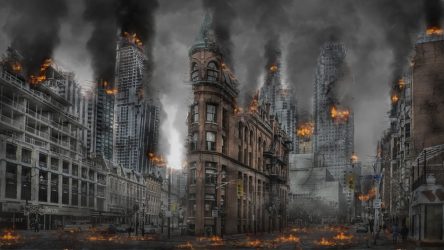
Imagine a typical conflict in fiction: A wife goes on a shopping spree and spends a large portion of their money and attempts to hide it from her husband. Unfortunately for her, her husband catches her at one of the high-end stores she’s perusing. Unfortunately for him, it’s because he’s there with his mistress. The conflict escalates from there, and the plot continues to thicken, until eventually the husband and wife reconcile their differences and forgive each other. By the end, everything goes back to exactly how it was before.
Does anything about that feel strange?
While many readers read fiction because it transports them into another universe, they still expect the events of the plot to be realistic within the context of the story and to have realistic consequences. When a person finds out their significant other has cheated on them or hidden major financial expenditures from them, they may very well forgive that person, but it isn’t realistic for everything to go back to how it was. Part of the forgiveness is acknowledging that the relationship has changed and there will always be suspicion, and things will never be the same.
When something happens in fiction, there should be lasting, real consequences for a character, the people, or even the entire fictional world because readers expect some level of realism within a story. Besides, change keeps a story from being static. If everything at the end of a story is just how it was at the beginning, what was the point of the story?

A non-example from recent pop culture is the movie Avengers: Endgame. If you happen to care about spoilers, you should skip this paragraph. In the movie, half of all people have been removed from existence, and the heroes are trying to get them back. Five years later, they succeed, and billions of people reappear, rejoin their families and reintegrate into society, with the only shown lasting effects of such an enormous and devastating event being the death of a few major characters. In the story, there were few lasting changes to the world itself, and everything seemed to easily return to the way it had been five years before, and it doesn’t feel right. You’d expect there to be problems with housing, with food, with general infrastructure after having billions of people missing for five years, but there doesn’t seem to be any.
A better example of an apocalyptic scenario being “fixed” but having very real and lasting consequences to the world of a story is in World War Z by Max Brooks. The story follows a fictional zombie apocalypse from the very first signs of anything going wrong to when the world returns to some semblance of normalcy, and beyond. The apocalypse ends, the world recovers, but it is shown to be nothing like it once was. People have changed, societies have changed, entire environments have changed, and even though the major problems have been fixed, there are still repercussions that characters have to deal with on a daily basis due to the events. There is real, lasting change, and it makes the story, as unrealistic as a zombie apocalypse is, feel that much more realistic to the reader.

Not every conflict that occurs in a piece of fiction has to be apocalyptic or otherwise world-changing, but every conflict should have lasting consequences. If not, you risk having written a story that, while perhaps interesting and exciting, doesn’t resonate with a reader as well as it could have.

Jess Elliott
Great article. Totally agree! I think that’s why dream sequences aren’t popular if not handled well… so much happens then poof! Just kidding! We’re all good.
[Longish tangent alert, sorry, the morning coffee is kicking in, the babble is a-flowing, you can skip this paragraph if you’re in a hurry.]
I JUST watched a 1941 movie The Shadow On the Stairs last night… much running about in a boarding house, secret affairs, some kind of spy plot, much whispering about the plan to take place at midnight, a mysterious man in a turban, someone runs down the stairs with a veil over her head. Enough intrigue to keep interest at least. The next morning, no one shows up for breakfast. Rooms are empty and oh, eek! A body! And oh! Another one! And the maid who got fired really killed herself in a closet? What? It’s all fairly interesting once you sort out all the characters, but then in the last five minutes– whoop! It was all a fictional story written by a famous author who’d disguised himself…he used the characters in the boarding house as his inspiration. Everyone is fine, there is much chuckling. Then a wildly smarmy, wasn’t that a lark, and oh, darling, let’s get married! WHAT? It felt as if the movie was about to end but the director got fired. A new director came in and decided to make it a comedic romp instead of a murder mystery. Perhaps the 1941 audience needed a lark, but now it’s just weird. The kind of film that inspires the launching of rotten tomatoes toward the screen.
[Here, if you jumped 🙂 ] Yes. Action or even inaction has consequences. (As a Buddhist, I’ll throw in that this IS the essence of karma–action and result.) Even if you sit in a cave for 40 years doing ‘nothing’ there is a result–you didn’t have kids, you didn’t travel, you didn’t meet anyone. Wake up in the morning or don’t= consequences. Get in the car and go somewhere or don’t = consequences. Drink that extra cup of coffee or don’t = consequences. A great, gripping read has at least one if not multiple story arcs of plot and character development. And even if you do end up back where you started, there HAS to have been change of some kind.
Well done, James, and I love the sad balloon pic.
Joan H. Carter
Worthwhile message, James. You’ve pointed out that realistic consequences can resonate with the reader’s real emotions in spite of wildly unrealistic, fictional circumstances and provide a bit of vicarious experience to the reader’s understanding of himself, life, and others.